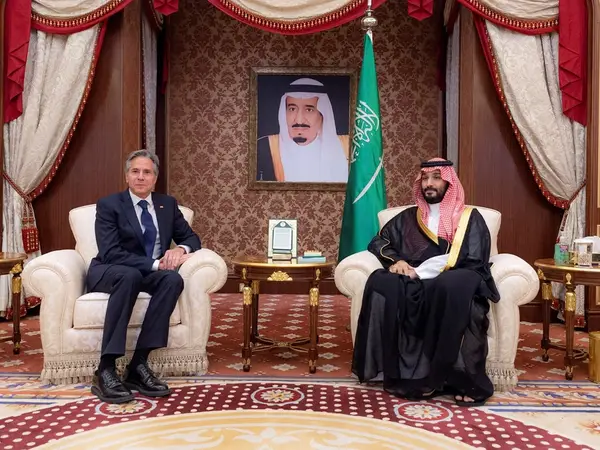As US Secretary of State Antony Blinken is in Saudi Arabia for talks, Washington reiterated its commitment to respond to Iran’s aggression in regional waters.
Blinken, who arrived in Saudi Arabia late on Tuesday for a much-anticipated visit amid frayed ties due to deepening disagreements on everything from Iran policy to regional security issues, oil prices and human rights, met with Saudi Crown Prince Mohammed bin Salman on Wednesday.
According to a US official, the two had an "open, candid" conversation for an hour and forty minutes, covering topics including Israel, the conflict in Yemen, unrest in Sudan as well as Iran.
"They discussed the potential for normalization of relations with Israel and agreed to continue dialogue on the issue," the official said.
At a speech in Washington hours before departing for Saudi Arabia, Blinken said the United States had a "real national security interest" in advocating for normalizing Saudi-Israeli ties but cautioned about the time frame."We have no illusions that this can be done quickly or easily," Blinken said.
Although Riyadh gave its blessing to Persian Gulf neighbors United Arab Emirates and Bahrain establishing relations with Israel in 2020, it has not followed suit. In contrast, in April, Saudi Arabia restored ties with the Islamic Republic, a regional rival and Israel's archnemesis.
Two days after Blinken's visit, Riyadh will host a major Arab-Chinese investment conference. Blinken is also set to travel to China for talks in the coming weeks, in a visit intended by Washington to be a major step toward what President Joe Biden has called a "thaw" in Sino-American ties.
The visit came two days after US and UK navies acted when a merchant ship was being harassed by Iran’s Revolutionary Guard’s Navy fast-attack boats in the Strait of Hormuz, in a sign of a more forceful policy in the Persian Gulf.
Condemning this behavior, a State Department spokesperson told Iran International on Tuesday that the move was a “clear attempt to threaten and interfere with commercial shipping” in the Middle East.
Emphasizing that the United States is committed to supporting regional maritime security coalitions within the Middle East region, the spokesperson said Washington does not seek conflict or escalation with Iran. "We are committed to responding to Iranian aggression together with our global Allies and our partners in the Middle East region to ensure the freedom of navigation through the Strait of Hormuz and other vital waterways.” the official added.
Iran has hundreds of fast attack boats that for years have not only harassed civilian vessels but, on many occasions, have come dangerously close to US and other warships in a show of force. Over the past two years, Iran has now harassed,attacked or interfered with the navigational rights of 16 internationally flagged merchant vessels in regional waters.
The recent incident in the Strait of Hormuz took place against the backdrop of reports about the formation of a new naval alliance in the region with Iran being a main force.The US says it “defies reason” for Iran to be part of a regional naval alliance while the Islamic Republic is the main reason for maritime insecurity in the Persian Gulf region.
Iranian media claimed in recent days that a regional naval coalition is in the offing though this was not confirmed by any mentioned parties. On Saturday, Iran's navy commander officially announced that his country and Saudi Arabia, as well as the United Arab Emirates, Qatar and Bahrain, plan to form a naval alliance, that would include Iraq, India and Pakistan.
